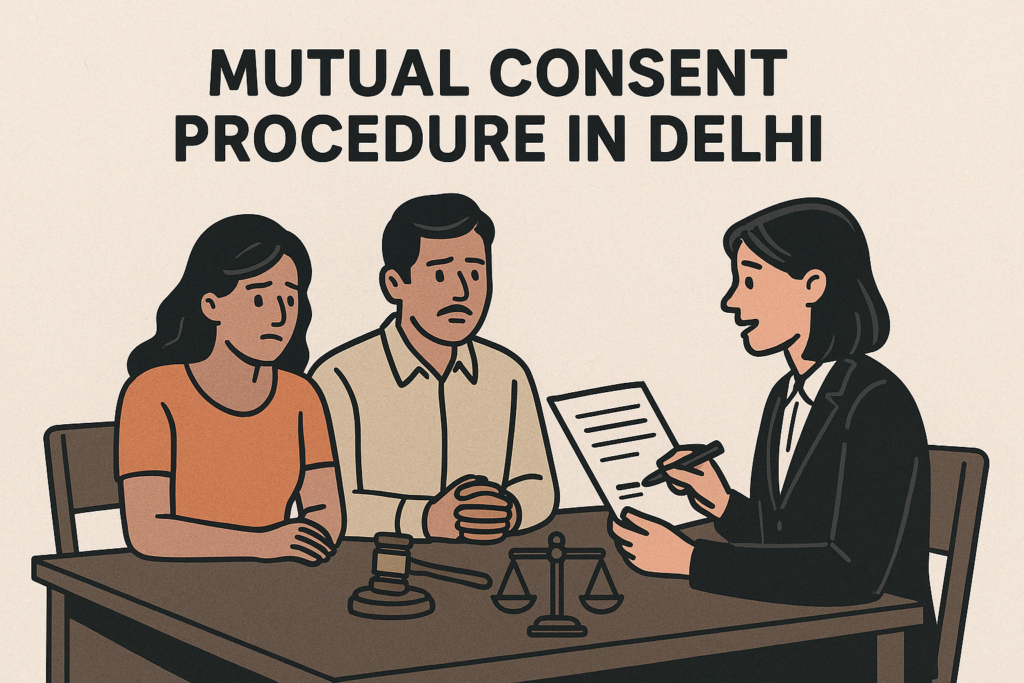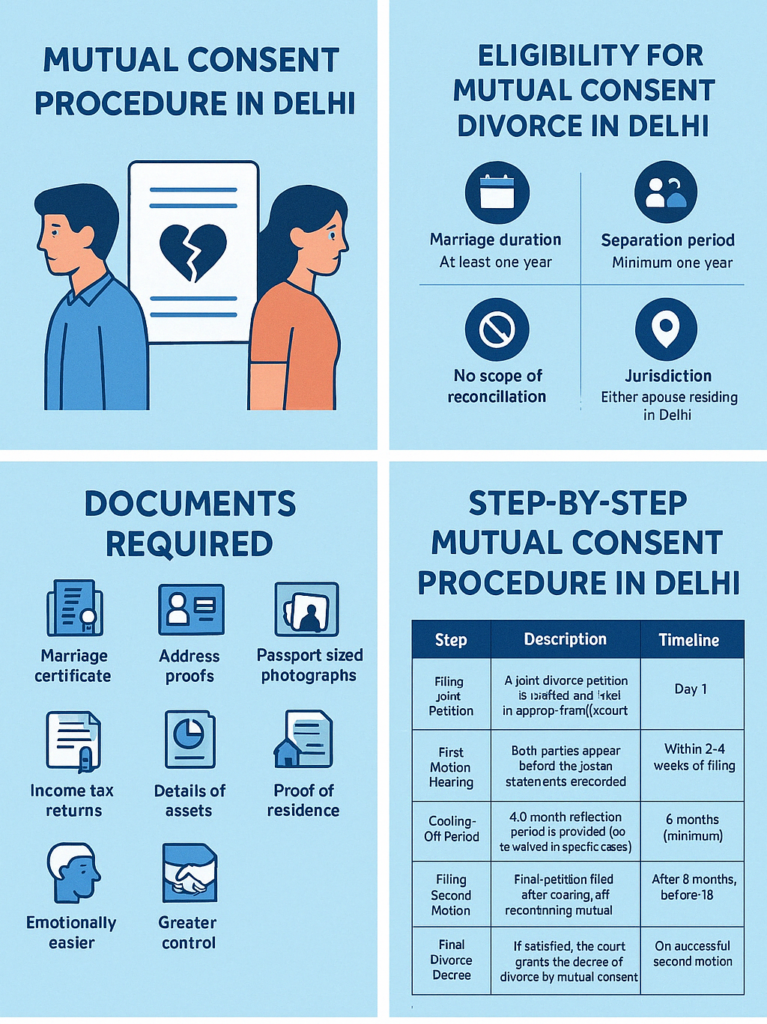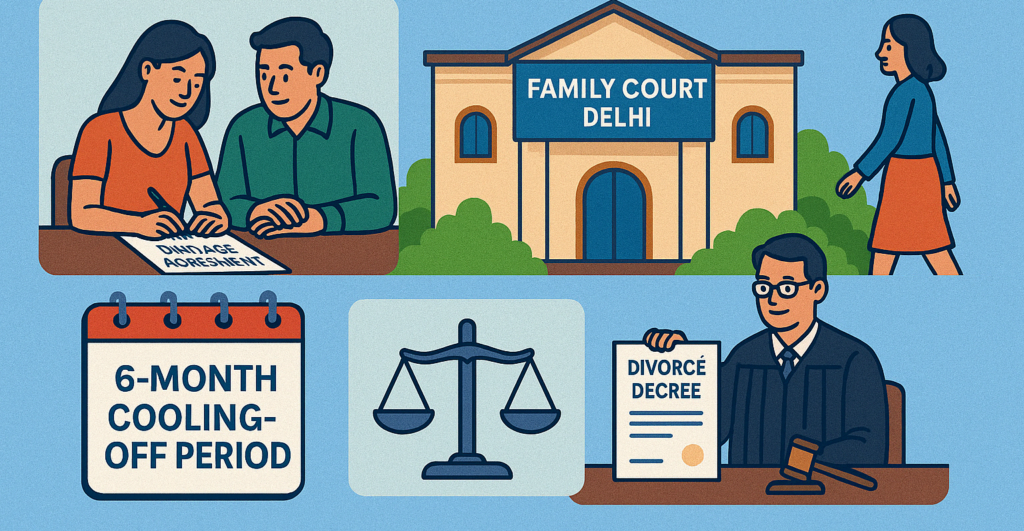Divorce is a painful but necessary legal process for most couples who are unable to keep their marriage going. While contentious divorces often consist of long, frustrating court cases, mutual consent divorces are a less punishing and friendly choice. If you are a capital city resident couple, knowing the mutual consent Procedure in Delhi can help you navigate this legal procedure with confidence and clarity.
This blog tries to walk you through each step of the mutual consent Procedure in Delhi, ranging from eligibility and required documents to the legal process and advice for a smooth divorce.

What is Mutual Consent Divorce?
The mutual consent procedure in Delhi is a legal process through which couples can dissolve their marriage when both the partners consent to the breakup. Mutual consent divorce is given under Section 13B of the Hindu Marriage Act, 1955, for Hindu couples who have been separated for one year or more and cannot cohabit.
The Delhi mutual consent process is controlled by the same central legislation but implemented through the local Family Courts located in different parts of the city.

Eligibility for Mutual Consent Divorce in Delhi
Before filing the Mutual Consent Procedure in Delhi, make sure that the below conditions are fulfilled:
- Marriage period: The two must have been married for a period of one year or more.
- Separation period: The spouses should have been living separately for at least one year.
- No scope of reconciliation: There must be no chance of getting back together.
- Mutual agreement: Both partners must agree to the divorce and its terms (alimony, child custody, property division, etc.).
- Jurisdiction: Either spouse must be residing in Delhi or the couple last resided together in Delhi.
Where to File for Mutual Consent Divorce in Delhi?
The mutual consent procedure in Delhi is carried out at Family Courts situated in different districts, such as:
- Tis Hazari Courts (Central & West Delhi)
- Karkardooma Courts (East Delhi)
- Saket Courts (South Delhi)
- Dwarka Courts (South-West Delhi)
- Rohini Courts (North-West Delhi)
Choose the court based on where you or your spouse resides or where you last lived together.
Documents Required
To initiate the mutual consent procedure in Delhi, you’ll need to prepare and submit the following:
- Marriage certificate (if available)
- Address proofs of both spouses
- Passport-sized photographs
- Aadhar cards or valid ID proofs
- Income tax returns (last 2–3 years)
- Details of movable and immovable assets
- Proof of residence (rental agreement or utility bill)
- MOU or settlement agreement (regarding alimony, maintenance, custody, etc.)

Step-by-Step Mutual Consent Procedure in Delhi
Let’s break down the mutual consent procedure in Delhi into clear steps:
| Step | Description | Timeline |
| 1. Filing Joint Petition | A joint divorce petition is drafted and filed in the appropriate Family Court. | Day 1 |
| 2. First Motion Hearing | Both parties appear before the judge; statements are recorded. | Within 2–4 weeks of filing |
| 3. Cooling-Off Period | A 6-month reflection period is provided (can be waived in specific cases). | 6 months (minimum) |
| 4. Filing Second Motion | Final petition filed after cooling-off, reconfirming mutual consent. | After 6 months, before 18 |
| 5. Final Divorce Decree | If satisfied, the court grants the decree of divorce by mutual consent. | On successful second motion |
Step 1: Drafting and Filing the Joint Petition
Both parties prepare a joint petition, stating grounds for divorce and terms of settlement. It’s filed with the appropriate Family Court through legal counsel.
Step 2: First Motion Hearing
The court schedules the first hearing. During this hearing, both spouses must appear before the judge, who will record their statements and assess whether the separation is truly mutual. If satisfied, the court will accept the petition and pass the first motion order.
Step 3: Six-Month Cooling-Off Period
There is a legislative 6-month cooling-off period following the first motion. This interval is intended to provide the couple time to think and reconcile. However, this period can be waived by the court in exceptional cases (as per the Supreme Court’s 2017 ruling).
Step 4: Filing the Second Motion
After the cooling-off period (or its waiver), the couple must file for the second motion within 18 months of the first motion. In this hearing, the court makes the final declarations and reaffirms the mutual consent.
Step 5: Divorce Decree
If the court is satisfied that the consent is genuine and all matters have been amicably settled, it will grant a decree of divorce by mutual consent. The marriage is solved from the date of the arrangement under the law.
Waiver of Cooling-Off Period in Delhi
The Delhi courts have allowed the waiver of the 6-month cooling-off period in cases where:
- The couple has been living apart for over 18 months.
- There is no chance of reconciliation.
- All issues (property, alimony, custody) are resolved.
A separate application must be filed, and the court has discretionary power to accept or reject it.
Advantages of Mutual Consent Divorce
The mutual consent procedure in Delhi is often preferred due to several benefits:
- Time-efficient: Finalized within 6–18 months, unlike contested divorces, which may drag on for years.
- Cost-effective: Legal and court fees are significantly lower.
- Emotionally easier: Less adversarial and more respectful process.
- Mutual control: Both parties decide on terms like maintenance, custody, and property.
Legal Help: Do You Need a Lawyer?
While it is possible to file a mutual consent petition without a lawyer, it’s highly recommended to seek professional help. An experienced lawyer in Delhi can help with:
- Drafting the petition and MOU
- Ensuring your legal rights are protected.
- Representing you effectively in court
- Speeding up the process
Timeframe and Cost of Mutual Consent Procedure in Delhi
- Timeframe: Typically 6 to 18 months.
- Cost: Can range between ₹15,000 to ₹1,00,000 depending on lawyer fees, documentation, and court charges.

Conclusion
The mutual consent procedure in Delhi offers a respectful and peaceful legal route for couples who no longer wish to stay married. With clear legal guidelines, supportive family courts, and the possibility of a quicker resolution, it stands as a humane alternative to contested divorce battles.
If you and your spouse are ready to part ways amicably, consider the mutual consent procedure in Delhi path. Consult a qualified family lawyer, prepare your documents carefully, and take that step towards emotional and legal closure.
Need support in registration for a mutual consent divorce in Delhi? Reach out for legal assistance and ensure your rights and dignity are safeguarded during the process.
